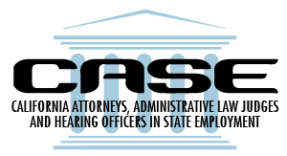Dear Member of Bargaining Unit 2:
CASE is very concerned with the State’s and many departments’ response to the Coronavirus (COVID-19). Today we sent the attached letter to CalHR and all departments employing members of Unit 2. In the letter we insist that the state follow the guidelines of the Centers for Disease Control (CDC) and Cal-OSHA and mandate that all departments prioritize employee and public safety by implementing telework for all members of CASE except in cases of unquestionable mission critical need for in-office work.
While CASE has been given confirmation from CalHR that all departments have been given tools to implement an emergency telework program or expand their existing program based on an evaluation of their operational needs, no departments have yet implemented sufficient expansion of their telework programs. Additionally, CASE has requested that all departments postpone or cancel all large meetings that are also not considered mission critical.
The State has distributed guidelines to all departments regarding the use of Administrative Time Off (ATO) in their response to COVID-19. While we appreciate the limited approval of ATO in responding to the health crisis, we strongly believe that both ATO and telework should be used more broadly to protect employees and the public.
Per CalHR’s latest response, below is additional guidance on the authorized use of Administrative Time Off (ATO) for state employees during the period state departments are managing the impacts of COVID-19:
Employees subject to quarantine
An employee who is subject to quarantine or self-monitoring as issued from a local public health department, will be provided ATO and telework will be considered, consistent with department policy. An employee who chooses to travel to a high-risk country, however, after the CDC has posted its warning and upon returning to the US, becomes subject to quarantine will not be provided ATO and the employee should contact their department’s human resources office regarding leave options.
Employees who become ill during quarantine
An employee who has been subject to quarantine or self-monitoring as issued from a local public health department and tests positive for COVID-19 or otherwise becomes ill shall, no sooner than 14 days after the quarantine or self- monitoring began, use leave credits of all types available.
Employees caring for a sick family member
Employees caring for a family member or members who have tested positive for COVID-19 shall use leave credits of all types available to care for a sick family member.
Employees who have tested positive for COVID-19 or are caring for a family member who has tested positive for COVID-19 may be eligible for Family Medical Rights Act (FMLA) or California Family Rights Act (CFRA). Employees can work with their Human Resources office to determine if they meet eligibility. If the employee is eligible, they will need to obtain certification from their health care provider. Please see CalHR’s Online HR Manual http://hrmanual.calhr.ca.gov/Home/ManualItem/1/2107.
Employees impacted by school closures
CDPH provided guidance to local school officials regarding school closures that may be required to protect public health. Sudden school closures could disrupt work schedules and increase absenteeism. Departments should consider all viable options for telework and flexible work schedules. Employees shall use leave credits of all types available, including sick leave, to care for children as a result of school closure that officials determined was necessary to protect public health.
Employees considered at greatest risk
CDPH advises that the information available about risk groups is based on limited information and could change as we learn more about the disease. Early information out of China, where COVID-19 first started, shows that some people are at higher risk of getting very sick from this illness. This includes:
- Older Adults
- People with have serious chronic medical conditions like:
Heart Disease
Diabetes Lung
Disease
Upon an employee’s request, departments should consider all viable options for telework and flexible work schedules for individuals considered at greatest risk. Employees shall use leave credits of all types available, including sick leave, if their position is not conducive to telework.
ATO may be authorized, in limited circumstances, for employees who have exhausted all available leave balances and face a hardship due to illness, caring for a family member, or school closure as a result of COVID-19. ATO provided due to hardship shall be reported to CalHR.
While CASE is continuing to develop its response to this crisis, we want to assure you that your health is our top priority. If you have health concerns or family needs related to COVID-19 and are able to complete your work from home, we support your right to do so. If your department has no specific, clear mission critical need for you to work in-office, CASE will aggressively fight to protect you from any adverse consequences. Too many departments limit or completely deny telework in violation of the MOU based solely on a regressive attitude that to be productive, legal professionals must be seated at their desks.
We know that you are all working extremely hard for the people of California despite being paid substantially less than nearly all other relevant public agencies and you should not have to put your health at risk as part of your job.
This email may not reach all CASE members. Accordingly, CASE encourages you to pass this email along to any of your colleagues who may not have received it. If you are not receiving CASE emails and wish to receive future communications from CASE, please send an email to info@calattorneys.org and request to be added to the distribution list.
CASE also encourages you to send responses from your personal email address as opposed to your state email address. Please keep in mind that all responses will be treated as confidential by CASE.
As always, your support of CASE and your colleagues in Bargaining Unit 2 is greatly appreciated.
Sincerely,
The CASE Board of Directors

